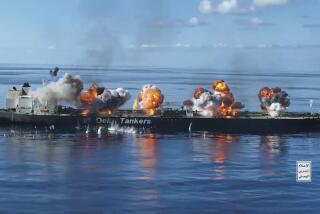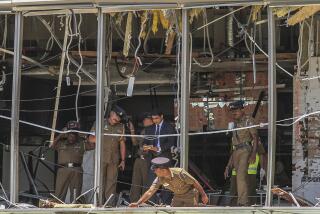Suicide Truck Bombing in Sri Lanka Kills 97 Troops
- Share via
COLOMBO, Sri Lanka — Suicide bombers rammed a truck laden with explosives into a Sri Lankan naval bus convoy Monday, killing 97 people and injuring more than 100 others days before peace talks scheduled between the government and Tamil Tiger rebels.
Most of the dead were sailors about to start vacation leave after serving in the violence-racked east. Some civilians were also believed to be among those killed in the attack, which occurred near the central town of Habarana.
The Sri Lankan military responded Monday evening by dispatching fighter jets to pound rebel positions in the northern part of the country, officials said. The extent of the air raids and resulting damage was not immediately known.
Although the Liberation Tigers of Tamil Eelam did not claim responsibility for the attack, the highly disciplined and well-armed force is infamous for pioneering suicide bombings. It is classified by the U.S. and the European Union as a terrorist organization.
The bombing was one of the deadliest such incidents in Sri Lanka since the signing of a 2002 cease-fire between the government and the Tamil Tigers, who are dedicated to establishing an independent homeland for the island’s ethnic minority Tamils.
The truce raised hopes of a lasting resolution to the ethnic conflict that has engulfed Sri Lanka for most of the last 23 years, but spiraling violence since the end of last year has in effect rendered the agreement void.
The latest round of bloodshed came amid a flurry of diplomatic activity aimed at heading off a return to all-out civil war. A Japanese peace envoy is in Sri Lanka to push for a respite from the fighting, and U.S. Assistant Secretary of State Richard Boucher is expected to arrive this week for a brief visit, in anticipation of talks between the government and the rebels scheduled for Oct. 28 and 29 in Switzerland.
That meeting is still on track, but hopes for a successful outcome have sunk in the face of intensified clashes between government security forces and the Tamil Tigers over the last week.
Fighting on the Jaffna peninsula in the north have killed scores of combatants in the last week. On Sunday, the Sri Lankan navy attacked a rebel boat suspected of smuggling weapons off the northwestern coast.
Monday’s bombing was seen by some as retaliation for that incident.
The convoy of 15 navy buses had stopped near Habarana for an early-afternoon break on its journey from Trincomalee, the eastern port city around which fierce fighting has raged for months, when the assailants’ vehicle plowed into at least one of the buses.
Many military buses have recently been fortified in response to a spate of deadly brushes with rebel-planted claymore mines, but even the strengthened frames were no match for such a powerful direct hit.
Sri Lankan President Mahinda Rajapakse urged his people to remain calm but condemned Monday’s attack as “further proof of the LTTE’s unmitigated commitment to violence to achieve its ends.”
International observers blame the Tamil Tigers for breaching the cease-fire accord last year and reviving the cycle of attacks and counterattacks that has led to the agreement’s unraveling.
Yet they also accuse Rajapakse’s government of dragging its feet in addressing the political demands of the island’s Tamils, who have endured decades of discrimination and persecution at the hands of the Sinhalese majority.
Critics say that Rajapakse has tacked to the right to please the hard-line Sinhalese nationalists who helped boost him into office last November.
Since then, the fighting has claimed 2,000 lives, at least half of them civilians, pushing the death toll in Sri Lanka’s civil conflict past 65,000. In addition, thousands of refugees have fled the island for neighboring India, creating a humanitarian crisis.
*
Times staff writer Chu reported from New Delhi and special correspondent Rutnam from Colombo.
*
(BEGIN TEXT OF INFOBOX)
Back story
The Liberation Tigers of Tamil Eelam have been fighting since 1983 for an independent homeland for the Tamil minority in Sri Lanka’s north and east, where they say they are discriminated against by the Sinhalese majority.
The war killed nearly 65,000 people before a cease-fire was declared in 2002. In the last year, fighting has rekindled. Since December, hundreds more have died, a large number of them civilians.
More to Read
Sign up for Essential California
The most important California stories and recommendations in your inbox every morning.
You may occasionally receive promotional content from the Los Angeles Times.














